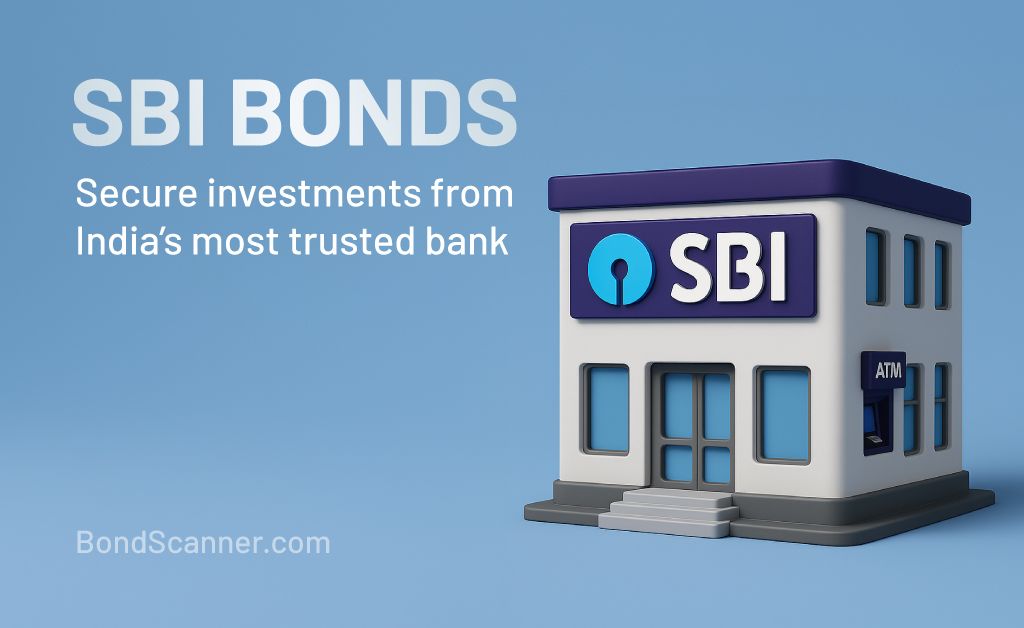SBI Bonds: Understanding Features, Types, and How to Invest
24 October 2025

What Are SBI Bonds?
The State Bank of India (SBI) is one of the most trusted financial institutions in India. Apart from traditional banking products, SBI also issues and manages various bond instruments that allow investors to earn fixed returns while contributing to infrastructure and corporate financing.
SBI bonds have gained significant attention from investors seeking predictable income, moderate risk, and the credibility of India’s largest public sector bank. Let’s explore what SBI Bonds are, their types, interest rates, and how to invest in them.
SBI Bonds are debt instruments issued by the State Bank of India or its subsidiaries to raise funds for lending and business operations. When you invest in these bonds, you are lending money to the bank, and in return, SBI pays you periodic interest (coupon) and returns the principal at maturity.
These bonds are backed by SBI’s strong financial profile and often carry high credit ratings (AAA/AA+), making them one of the safer fixed-income options available to retail and institutional investors.
Types of SBI Bonds in India
SBI offers multiple categories of bonds and debt instruments. Here’s a breakdown of the most common ones available to investors:
1. SBI Tier-II Bonds (Basel III Compliant)
These bonds are issued by SBI to strengthen its Tier-II capital base, as per RBI regulations.
Tenure: Typically ranges from 10 to 15 years
Interest Rate: Generally between 7.5% and 8.5% per annum (subject to market conditions)
Features: Redeemable after a lock-in period, tradable on exchanges, and suitable for long-term investors
2. SBI Infrastructure Bonds
These bonds are issued to fund infrastructure projects in India.
Interest Rate: Competitive fixed rates, usually higher than standard deposits
Tenure: Medium to long-term
Tax Benefit: Certain series (when notified by the government) may offer tax exemptions under Section 80CCF.
3. SBI Corporate Bonds and Debt Funds
Through SBI Mutual Fund, investors can access corporate bond funds that invest in high-rated debt securities, including SBI’s own issuances.
Example: SBI Corporate Bond Fund
Objective: Generate stable income through investment in high-quality corporate debt instruments
Minimum Investment: As per mutual fund norms (generally ₹5,000 or above)
4. SBI Perpetual Bonds
These are long-term instruments without a fixed maturity date.
Interest Rate: Varies depending on market rates and credit spreads
Risk Level: Slightly higher than traditional bonds, as they are subordinated debt instruments
Purpose: To strengthen SBI’s Tier-I capital
SBI Bonds Interest Rate (2025 Overview)
The interest rates for SBI Bonds vary depending on bond type, tenure, and market conditions. As of 2025, indicative yields range between 7.5% and 8.6% per annum, based on recent market data.
While these rates may fluctuate with RBI policy changes, SBI bonds continue to offer competitive returns compared to fixed deposits, especially for long-term investors seeking regular income.
(Note: Interest rates mentioned are for illustrative purposes and may vary based on issuance.)
How to Buy SBI Bonds Online
Investors can purchase SBI Bonds both online and offline through authorized platforms. Here’s a step-by-step process for online investment:
1. Through the NSE/BSE Platform
Log in to your Demat and trading account linked with NSE or BSE.
Search for the specific SBI bond series you wish to buy.
Check the bond price today, coupon rate, and maturity details.
Place your order just like you would for shares.
2. Through Registered OBPPs (Online Bond Platform Providers)
SEBI-registered Online Bond Platforms, such as, facilitate access to listed SBI bonds in a transparent, regulated environment.
Bonds are settled through clearing corporations.
All investor holdings reflect directly in the Demat account, ensuring safety and ownership clarity.
3. Through State Bank of India (for select RBI Bonds)
For products like RBI Floating Rate Savings Bonds, you can invest directly through designated SBI branches or its online portal.
List of SBI Bonds and Examples
| Bond Type | Tenure | Interest Rate (Approx.) | Rating | Tradable |
|---|---|---|---|---|
| SBI Tier-II Basel III Bonds | 10 Years | 8.15% | AA+/AAA | Yes |
| SBI Infrastructure Bonds | 15 Years | 7.80% | AAA | Yes |
| SBI Perpetual Bonds | No fixed maturity | 8.25% | AA | Yes |
| SBI Corporate Bond Fund (Mutual Fund) | NA | Market-linked | NA | No (MF units tradable) |
Why Do Investors Consider SBI Bonds?
Trust & Credibility: Issued by India’s largest public sector bank.
Predictable Income: Regular coupon payments ensure steady returns.
Diversification: Adds a stable, fixed-income layer to portfolios.
Transparency: Listed on exchanges; prices and yields are publicly available.
Accessibility: Available in denominations suitable for retail investors.
Risks to Consider
While SBI Bonds are considered relatively safe, investors should understand potential risks before investing:
Interest Rate Risk: Prices may fall if interest rates rise.
Credit Risk: Although low for SBI, still present for any issuer.
Liquidity Risk: Some series may have limited trading volume.
Reinvestment Risk: Future reinvestment yields may be lower.
FAQs on SBI Bonds
Q1. Are SBI Bonds safe to invest in?
Yes. SBI bonds are backed by one of India’s most trusted banking institutions and often carry high credit ratings, minimizing default risk.
Q2. What is the current SBI Bonds interest rate in 2025?
As of 2025, most SBI bonds offer interest rates in the range of 7.5% to 8.6%, depending on the issue and market conditions.
Q3. How can I buy SBI bonds online?
You can purchase them through NSE/BSE, SEBI-registered Online Bond Platforms like BondScanner, or directly from SBI for specific bond issues.
Q4. What is the minimum investment in SBI bonds?
It varies by issue type — Tier-II and Infrastructure Bonds typically start from ₹10,000, while RBI bonds through SBI can start from ₹1,000.
Q5. Are SBI bonds taxable?
Yes. Interest earned on SBI bonds is taxable as per your income tax slab. However, certain government-notified bonds may offer exemptions.
Conclusion
SBI Bonds combine trust, transparency, and predictable income, making them a valuable component of a diversified fixed-income portfolio. With multiple options like Tier-II, Infrastructure, and Perpetual Bonds, investors can align their goals with suitable maturity periods and risk levels.
By understanding features, risks, and market mechanisms, investors can make informed decisions and leverage regulated platforms like BondScanner for transparent access to bond markets.
Disclaimer
This blog is intended solely for educational and informational purposes. The bonds and securities mentioned herein are illustrative examples and should not be construed as investment advice or personal recommendations. BondScanner, as a SEBI-registered Online Bond Platform Provider (OBPP), does not provide personalized investment advice through this content.
Readers are advised to independently evaluate investment options and seek professional guidance before making financial decisions. Investments in bonds and other securities are subject to market risks, including the possible loss of principal. Please read all offer documents and risk disclosures carefully before investing.
Recent Blogs

GPF Full Form: Understanding General Provident Fund and Its Role in Salary
A detailed guide explaining the GPF full form in salary, its benefits, working mechanism, and how it functions for employees in India.
20 Feb 2026

Difference Between Loan and Debenture: Understanding Key Financial Concepts
Explore the key differences between loans and debentures, their characteristics, benefits, and how each works in corporate finance.
20 Feb 2026

AMO Order Explained: What It Is, Charges, Timing & How to Place an AMO Order in Zerodha
Learn about AMO (After Market Orders), how they work, charges, validity, and how to place AMO orders in Zerodha, along with key differences from pre-market orders.
19 Feb 2026